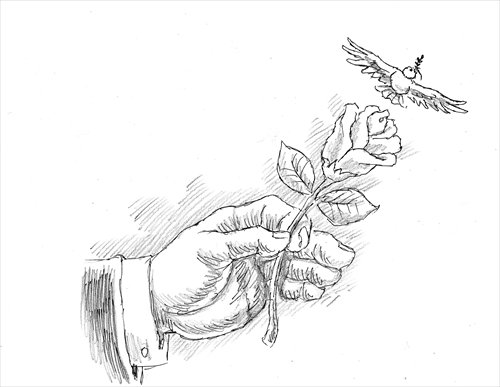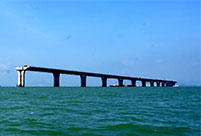

 |
| (Illustrations: Peter C. Espina/GT) |
Chinese President Xi Jinping's first state visit to the US sent two impressive messages. First, he reiterated both in Seattle and Washington that China will never stop reforms or close its doors to the outside world, and China made a strategic decision to firmly adhere to the path of peaceful development. Second, China will prioritize a new type of major power relationship with the US despite the ups and downs.
Apart from a fruitful list of achievements reached in the Xi-Obama summit, people should pay more attention to assurances made by both sides. It's unrealistic to expect solutions to thorny issues such as cyber security on one summit.
Beijing and Washington are making huge efforts to maintain healthy bilateral relations, preventing a disastrous rivalry. During their talks at Blair House on Thursday, US President Barack Obama told Xi that he doesn't believe in the "Thucydides' trap" where conflicts are inevitable between existing and emerging powers, urging major powers, the US and China in particular, to avoid conflicts. Obama said he believes the US and China will be able to manage their differences.
There is no doubt that a new relationship is emerging between China and the US, which is embodied in three aspects.
Despite the US' commanding lead in many fields such as the military, the gap between China and the US is narrowing with China's rapid rise. Besides, Washington and Beijing need to jointly deal with an array of new challenges such as climate change and cyber security, the significance and complexity of which is far greater than expected. And China-US relations should be viewed in the context of a new global setting, with the diffusion of power and disorder as two prominent characteristics of the new world order.
Unfortunately, both China and the US have to tackle burdensome domestic challenges, including economic inequality, political dysfunction and energy consumption restructuring. When Obama and Xi met, they must have felt for each other over how difficult it is to turn policy into action. Dealing with internal challenges will undoubtedly distract both leaders from bilateral ties.
Nonetheless, Xi's visit shows the world the sound strategies Beijing has adopted to address the above-mentioned problems.
By propelling bilateral cooperation at the local and business levels, Xi aims to make ordinary people benefit from China-US ties. Over the past 10 years, 42 US states have achieved triple-digit increases in their exports to China. In 2014, China's commodities and services exports to the US created approximately 12 million jobs in the US. Both leaders reiterated that arriving at a high-standard bilateral investment treaty is the most important economic mission, and both sides will work toward that.
In addition, Xi stressed that China and the US, as two major cyber powers, should strengthen dialogue and cooperation. China will set up a joint dialogue mechanism with the US on fighting cybercrimes, especially the theft of intellectual property and trade secrets. As cyber security is increasingly becoming a global challenge, the two countries will also discuss international rules of conduct in cyberspace.
Through Xi's visit, China and the US have agreed to make concerted efforts to achieve an inclusive, tenacious and constantly improving international economic system.
The IMF overhaul plan, which was passed in 2010, hasn't been implemented due to the US Congress' refusal to ratify it. A backward and inefficient international economic governance mechanism will undermine the interests of both countries. Therefore, China and the US will enhance coordination and boost the governing ability of multilateral financing institutions such as World Bank and the Asian Development Bank.
The China-initiated Asian Infrastructure Investment Bank will also work to increase transparency and abide by high international standards.
China has likewise surprised the world on the issue of climate change. China said it will establish a national cap-and-trade system for CO2 emissions by 2017. It will invest $3.1 billion to help other developing countries deal with climate change, which shows that China hopes to break the deadlock between developing and developed nations in the field.
It's clear that China has tremendous goodwill in developing relations with the US, which merits recognition.
However, establishing stable and positive China-US relations requires the efforts of both countries. Obama has often said that the US welcomes a peaceful and prosperous rise of China. Beijing hopes Washington walks the talk.
 Construction of HK-Zhuhai-Macao Bridge enters final stage
Construction of HK-Zhuhai-Macao Bridge enters final stage Model of heavy-lift copter makes debuts at Tianjin expo
Model of heavy-lift copter makes debuts at Tianjin expo Art photos of Chinese beauty in Han Chinese clothing
Art photos of Chinese beauty in Han Chinese clothing Stunning photos of air show in China’s V-Day parade
Stunning photos of air show in China’s V-Day parade Models change clothes on street in Hangzhou
Models change clothes on street in Hangzhou Charming Chinese female soldiers
Charming Chinese female soldiers Beauty vs. muscular man
Beauty vs. muscular man World's passenger plane giants convene in Beijing aviation expo
World's passenger plane giants convene in Beijing aviation expo First day in kindergarten
First day in kindergarten On the way
On the way Model village
Model village UK opens bidding for rail contracts
UK opens bidding for rail contracts Muslims in Xinjiang celebrate Corban Festival
Muslims in Xinjiang celebrate Corban FestivalDay|Week